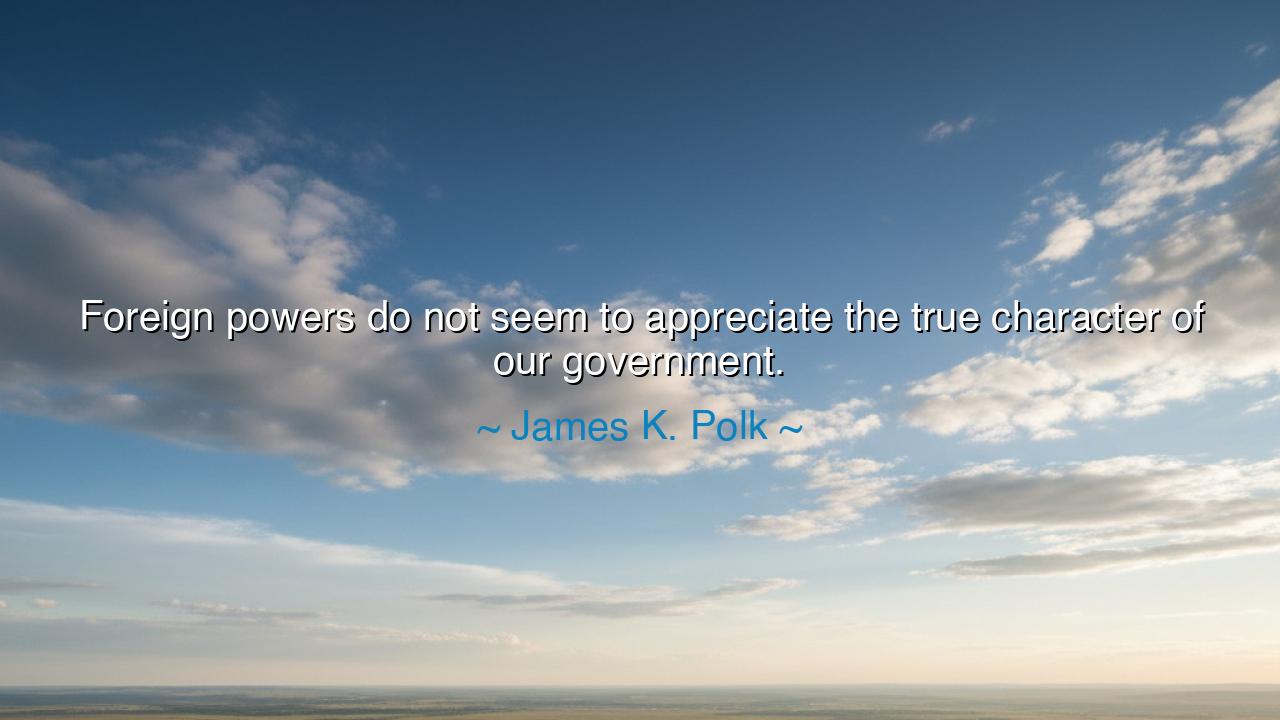
Foreign powers do not seem to appreciate the true character of






When James K. Polk declared, “Foreign powers do not seem to appreciate the true character of our government,” he spoke not with arrogance, but with conviction born from struggle. These words emerged in the mid-19th century, when the United States was still defining itself in the eyes of the world — a young republic surrounded by monarchies, empires, and dynasties that measured power by lineage, not by liberty. To them, this experiment of democracy seemed fragile, naïve, and temporary. Yet Polk, a man of stern will and unflinching purpose, saw clearly that the strength of the American government lay not in crowns or castles, but in the consent of its people. He warned that those who underestimated its character misunderstood its soul.
In his time, the United States was expanding rapidly, driven by the vision of Manifest Destiny — the belief that the nation was destined to spread its ideals across the continent. But foreign observers, especially in Europe, saw this expansion not as destiny, but as arrogance. They doubted that a government built on democracy could sustain such power. They believed that a people who ruled themselves would crumble under the weight of ambition and discord. Polk’s words rose as a challenge to these doubts: he reminded the world that America’s government was not an accident of history, but a deliberate creation — founded on law, liberty, and the disciplined will of its citizens.
To understand the spirit behind his words, one must look at Polk’s presidency itself. He was a leader of action — a man who completed the annexation of Texas, secured the Oregon Territory, and led the nation through the Mexican-American War, which expanded the United States to the Pacific Ocean. Yet foreign nations, particularly Britain and France, regarded the Republic with suspicion and contempt. They thought its leaders amateurs and its people too divided to endure. But Polk proved them wrong. Through diplomacy, calculation, and resolve, he showed that the American system — though noisy with debate — possessed a unity of purpose that no king could command. His administration revealed that democracy could be both energetic in peace and formidable in war.
The deeper meaning of this quote, however, reaches beyond Polk’s time. It speaks to the timeless truth that freedom often appears chaotic to those who have never tasted it. Monarchs saw a mob; Polk saw a people. Foreign observers saw instability; he saw vitality. The “true character” of the American government was not obedience but participation — not silence, but voice. Its strength was not in hierarchy, but in the moral conviction of its citizens. And that character, misunderstood by foreign eyes, became the very source of its endurance.
A striking example of this misunderstanding can be seen again in later history — during the Cold War. Totalitarian regimes mocked the “disorder” of democracy, predicting its collapse. Yet the same “disorder” — the debates, the protests, the free press — became the oxygen that kept liberty alive while oppressive states suffocated under their own weight. Just as Polk’s America confounded monarchies, modern democracy confounded dictatorships. For what they mistake for weakness — division, debate, dissent — is in truth the heartbeat of freedom.
But Polk’s warning is not only directed outward; it is also a message to us. To preserve what foreign powers once failed to understand, we ourselves must not forget the true character of our government. It is not a machine that runs without care; it is a living covenant that demands participation, courage, and virtue. When citizens grow complacent, when they trade liberty for comfort or truth for convenience, the Republic loses the very strength that once defied empires.
The lesson is as enduring as the nation itself: the character of a free government is the character of its people. If they are brave, it will be strong. If they are just, it will be noble. But if they become indifferent, it will decay, and the world will once again look upon freedom with scorn. Therefore, let every citizen be a guardian of that “true character” — not by mere words, but by action, integrity, and vigilance.
And so, remember this teaching: the world may not always understand the ways of freedom, for freedom is not the rule of one man, but the mastery of one’s own conscience. Let others mock, let others doubt — but hold fast to the sacred truth Polk knew: that a nation built upon liberty, sustained by faith, and defended by its people shall outlast the disbelief of kings.






AAdministratorAdministrator
Welcome, honored guests. Please leave a comment, we will respond soon